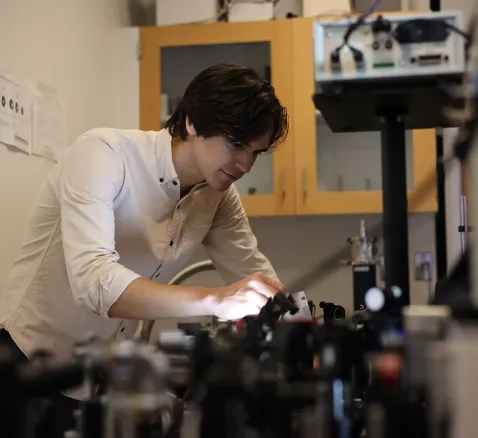Amir Pahlavan wins NSF CAREER Award
For a project that predicts how very small particles move in porous environments, Amir Pahlavan has won a Faculty Early Career Development (CAREER) Award from the National Science Foundation (NSF). The NSF CAREER award is a prestigious honor for young faculty members and supports the early career activities of teachers and scholars who are considered most likely to become the academic leaders of the future.
Pahlavan, assistant professor of mechanical engineering, will use the $610,000, five-year grant to develop a means of predicting and controlling the transport of colloids in porous media. The research has the potential for a broad range of applications, including drug delivery to tumors, filtration, wastewater treatment, and contaminant remediation.
His project will use a combination of experiments, numerical simulations, and theoretical modeling to determine the effects of chemical gradients - that is, varying concentrations of a substance - on the motion of colloids in porous media, which can include everything from soil to biological tissues to human-made materials.
“Chemical gradients are abundant in nature, from salinity gradients in coastal zones to pesticide application and irrigation in agriculture, and to metabolic activities in biological tissues,” Pahlavan said. “Yet how these gradients could shape the transport of colloidal particles has remained largely unknown. Colloids are everywhere, from clay particles and microplastics in subsurface environments to synthetic nanoparticles used in drug delivery and environmental remediation.”
One of the ways that Pahlavan studies these forces in controlled conditions is by conducting microfluidic experiments in which he uses polymeric materials to create his own porous material. An array of extremely small pillars is placed on a chip. Each pillar is about 100 microns in diameter, the size of average human hair.

“By understanding these dynamics, we can better predict where colloids will migrate and develop strategies to steer them towards targeted destinations.
Amir Pahlavan
Assistant professor of mechanical engineering
“Now you have a bunch of torturous pathways where flow can go through,” he said. The pillars are first placed in a very ordered pattern that the researchers can randomize to simulate real-world environments. "Studying these processes under controlled conditions gives us insights into how colloids navigate through complex porous networks. By understanding these dynamics, we can better predict where colloids will migrate and develop strategies to steer them towards targeted destinations."
Pahlavan became interested in this area of research as a postdoctoral associate at Princeton University, when he noted that despite the abundance of these chemical gradients in variety of porous environments, they had received little attention.
The ability to better steer particles could lead to breakthroughs in a range of disciplines, from environmental cleanup to drug delivery. One could guide the colloids to hidden targets using chemical gradients. These targets could be contaminant plumes, whose spreading can have devastating effects for water resources and environment, or tumor cells, which are often hard to reach to deliver drugs. This CAREER award allows Pahlavan to study the interplay between physics, chemistry, and hydrodynamics of these processes as a first step toward revisiting the traditional paradigms of colloid transport in porous media.
More Details
Published Date
Jul 9, 2025


